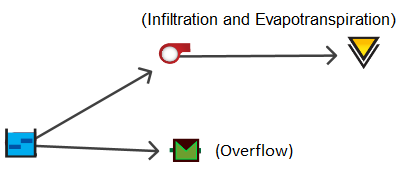| OTTHYMO object | VOSWMM object |
|---|---|
| EnhancedSwale |
Storage Unit with a Pump followed by an Outfall, a Weir and if applicable another Pump. The Storage Unit is used to model the main structure of Enhanced Swale. The first Pump and the followed Outfall are used to model the infiltration from the Enhanced Swale. The Weir is used to model the Overflow. The Type of the Weir is Transverse and the Height and Width of Weir use the default value 1 as in VOSWMM. Users should check these settings and make adjustment if needed. If the Enhanced Swale has Underdrain modeled, another Pump is added to model the Underdrain.
|
The parameters of VOSWMM Storage Unit are assigned as:
- NHYD = Chamber NHYD
- Name = Chamber Name
- Full Depth
- If the Swale is not a Dry Swale:
Full Depth = EnhancedSwale.SurfacePondingLayer.DepthStorageCurve.lastCellOfDepthColumn / unitConversion, where unitConversion is 1000 if OTTHYMO scenario is in metric unit and 12 if OTTHYMO scenario is in imperial unit. - If the Swale is a Dry Swale:
Full Depth = EnhancedSwale.SurfacePondingLayer.DepthStorageCurve.lastCellOfDepthColumn / unitConversion + EnhancedSwale.StorageLayer.Height, where unitConversion is 1000 if OTTHYMO scenario is in metric unit and 12 if OTTHYMO scenario is in imperial unit.
- If the Swale is not a Dry Swale:
- Storage Curve = Tabular
- Storage Table Curve (note: unitConversion is 1000 if OTTHYMO scenario is in metric unit and 12 if OTTHYMO scenario is in imperial unit.)
- If the Swale is not a Dry Swale:
Depth Area 0 (EnhancedSwale.SurfacePondingLayer. DepthStorageCurve.Storage(2) – EnhancedSwale.SurfacePondingLayer. DepthStorageCurve.Storage(1)) / (EnhancedSwale.SurfacePondingLayer.DepthStorageCurve.Depth(2) – EnhancedSwale.SurfacePondingLayer.DepthStorageCurve.Depth(1)) x unitConversion EnhancedSwale.SurfacePondingLayer.DepthStorageCurve.Depth(2) / unitConversion (EnhancedSwale.SurfacePondingLayer. DepthStorageCurve.Storage(2) – EnhancedSwale.SurfacePondingLayer. DepthStorageCurve.Storage(1)) / (EnhancedSwale.SurfacePondingLayer.DepthStorageCurve.Depth(2) – EnhancedSwale.SurfacePondingLayer.DepthStorageCurve.Depth(1)) x unitConversion … … EnhancedSwale.SurfacePondingLayer. DepthStorageCurve. Depth(n-1) / unitConversion (EnhancedSwale.SurfacePondingLayer. DepthStorageCurve.Storage(n) – EnhancedSwale.SurfacePondingLayer. DepthStorageCurve.Storage(n-1)) / (EnhancedSwale.SurfacePondingLayer.DepthStorageCurve.Depth(n) – EnhancedSwale.SurfacePondingLayer.DepthStorageCurve.Depth(n-1)) x unitConversion EnhancedSwale.SurfacePondingLayer. DepthStorageCurve. Depth(n) / unitConversion (EnhancedSwale.SurfacePondingLayer. DepthStorageCurve.Storage(n) – EnhancedSwale.SurfacePondingLayer. DepthStorageCurve.Storage(n-1)) / (EnhancedSwale.SurfacePondingLayer.DepthStorageCurve.Depth(n) – EnhancedSwale.SurfacePondingLayer.DepthStorageCurve.Depth(n-1)) x unitConversion
- If the Swale is not a Dry Swale:
- If the Swale is a Dry Swale:
Depth Area 0 EnhancedSwale.SurfacePondingLayer. DepthStorageCurve.Storage(2) – EnhancedSwale.SurfacePondingLayer. DepthStorageCurve.Storage(1)) / (EnhancedSwale.SurfacePondingLayer.DepthStorageCurve.Depth(2) – EnhancedSwale.SurfacePondingLayer.DepthStorageCurve.Depth(1)) x EnhancedSwale.StorageLayer.Porosity x unitConversion EnhancedSwale.StorageLayer.Height EnhancedSwale.SurfacePondingLayer. DepthStorageCurve.Storage(2) – EnhancedSwale.SurfacePondingLayer. DepthStorageCurve.Storage(1)) / (EnhancedSwale.SurfacePondingLayer.DepthStorageCurve.Depth(2) – EnhancedSwale.SurfacePondingLayer.DepthStorageCurve.Depth(1)) x EnhancedSwale.StorageLayer.Porosity x unitConversion EnhancedSwale.StorageLayer.Height (EnhancedSwale.SurfacePondingLayer. DepthStorageCurve.Storage(2) – EnhancedSwale.SurfacePondingLayer. DepthStorageCurve.Storage(1)) / (EnhancedSwale.SurfacePondingLayer.DepthStorageCurve.Depth(2) – EnhancedSwale.SurfacePondingLayer.DepthStorageCurve.Depth(1)) x unitConversion EnhancedSwale.SurfacePondingLayer.DepthStorageCurve.Depth(2) / unitConversion + EnhancedSwale.StorageLayer.Height (EnhancedSwale.SurfacePondingLayer. DepthStorageCurve.Storage(2) – EnhancedSwale.SurfacePondingLayer. DepthStorageCurve.Storage(1)) / (EnhancedSwale.SurfacePondingLayer.DepthStorageCurve.Depth(2) – EnhancedSwale.SurfacePondingLayer.DepthStorageCurve.Depth(1)) x unitConversion … … EnhancedSwale.SurfacePondingLayer.DepthStorageCurve.Depth(n-1) / unitConversion + EnhancedSwale.StorageLayer.Height (EnhancedSwale.SurfacePondingLayer.DepthStorageCurve.Storage(n) – EnhancedSwale.SurfacePondingLayer. DepthStorageCurve.Storage(n-1)) / (EnhancedSwale.SurfacePondingLayer.DepthStorageCurve.Depth(n) – EnhancedSwale.SurfacePondingLayer.DepthStorageCurve.Depth(n-1)) x unitConversion EnhancedSwale.SurfacePondingLayer.DepthStorageCurve.Depth(n) / unitConversion + EnhancedSwale.StorageLayer.Height (EnhancedSwale.SurfacePondingLayer. DepthStorageCurve.Storage(n) – EnhancedSwale.SurfacePondingLayer. DepthStorageCurve.Storage(n-1)) / (EnhancedSwale.SurfacePondingLayer.DepthStorageCurve.Depth(n) – EnhancedSwale.SurfacePondingLayer.DepthStorageCurve.Depth(n-1)) x unitConversion
The parameters of VOSWMM Pump used for infiltration are assigned as:
- NHYD = EnhancedSwale-NHYD[x]-Infil, where x is the NHYD of the Enhanced Swale
- Name = EnhancedSwale-NHYD[x]-Infil, where x is the NHYD of the Enhanced Swale
- Pump curve
The same method as infiltration and evapotranspiration modeling of Wetland Conversion will be used to define the curve table, time-series data and control rule.- Curve type = TYPE4
- Curve Name = EnhancedSwale-NHYD[x]-Infil, where x is the NHYD of the Enhanced Swale
- Other parameters keep as default as in VOSWMM.
The parameters of VOSWMM Outfall used for infiltration:
- Use the default values as in VOSWMM.
The parameters of VOSWMM Weir used for overflow are assigned as:
- NHYD: EnhancedSwale-NHYD[x]-Overflow, where x is the NHYD of the Enhanced Swale
- Name: EnhancedSwale-NHYD[x]-Overflow, where x is the NHYD of the Enhanced Swale
- Type = Transverse
- Flap Gate = Yes
- Can Surcharge = Yes
- Other parameters keep as default as in VOSWMM.
The parameters of VOSWMM Pump used for underdrain, if applicable, are assigned as:
- NHYD: EnhancedSwale-NHYD[x]-Underdrain, where x is the NHYD of the Enhanced Swale
- Name: EnhancedSwale-NHYD[x]-Underdrain, where x is the NHYD of the Enhanced Swale
- Pump curve
- Curve type = TYPE4
- Curve name = EnhancedSwale-NHYD[x]-Underdrain, where x is the NHYD of the Enhanced Swale
- Curve Table = Enhanced Swale Underdrain Discharge Curve




